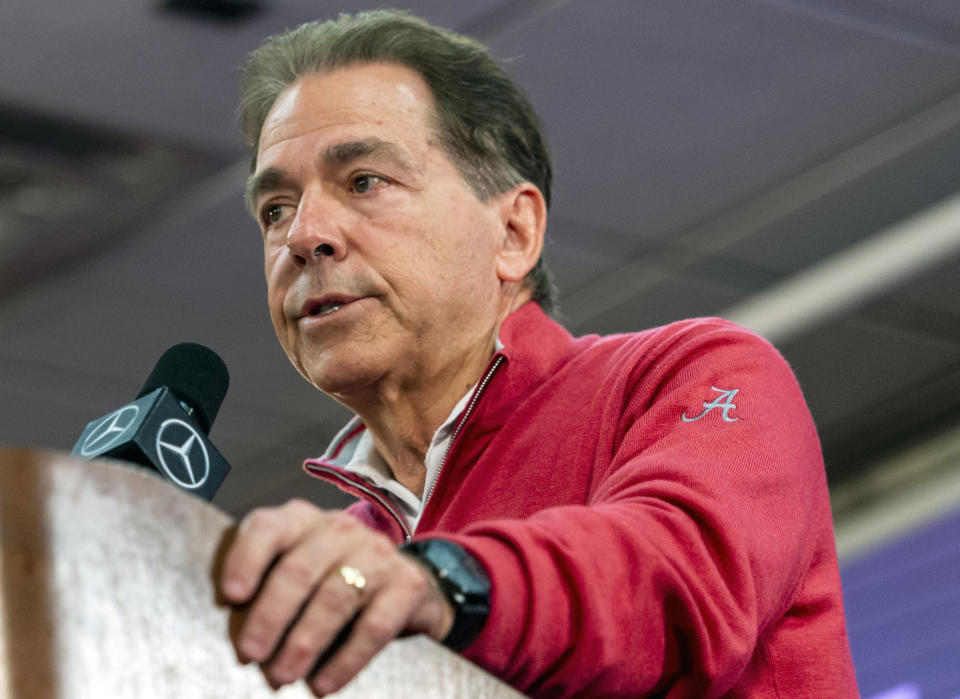College coaches make varied statements in wake of George Floyd's death, protests
The statements came from every corner of the collegiate universe the past few days. They came from videos on Instagram, Twitter statements on logoed letterhead and screenshots from the iPhone Notes app.
In the wake of George Floyd’s death in police custody in Minneapolis on Monday and the days of protests and unrest that have followed, many collegiate coaches and administrators spent the weekend figuring out the best way to articulate their feelings toward the issue. Or, whether to say anything at all.
Floyd was a black man who died after a white Minneapolis police officer held his knee on Floyd’s neck for nearly nine minutes. And the outrage that spilled out in the American streets has forged a generational moment, giving collegiate leaders the opportunity to potentially address racial inequity.
The way college coaches, leaders and athletic departments chose to discuss Floyd’s death and the aftermath has highlighted the awkward optics tied to race in college sports. The diversity of those in charge in college athletics — both coaches and administrators — lag far behind the participatory reality, especially in the revenue-producing sports of football and men’s basketball.
In Division I college basketball, according to the latest NCAA data, 56 percent of the players are black compared to just 28 percent of the coaches. In FBS football, there are just 14 black coaches in the 130 programs. That’s nearly 11 percent, compared to data that shows nearly half of Division I football players are black.
The disparities are similar in leadership. In Division I, 79 percent of athletic directors and 81 percent of head coaches in all sports are white.

Those dynamics led to an awkward undercurrent amid the variety of statements from leaders around college sports. There was everything from eloquent, searing and emphatic statements to clichéd ones that appeared to be made just for appearance’s sake. Clemson star quarterback Trevor Lawrence released a nuanced statement that said, “the injustice is clear… and so is the hate. It can no longer be explained away.” His coach, Dabo Swinney, had remained silent as of Sunday night, as was Duke’s Mike Krzyzewski. (Alabama’s Nick Saban released a statement late Sunday.)
Some coaches chose to use famous historical quotes to convey their feelings. Others focused on addressing the issue with their team directly. Some came off trite and forced, statements for the sake of statements. Villanova football defensive coordinator Ola Adams summed the flood of statements on Twitter this way on Sunday: “Real life actionable items > PR twitter ‘statements.’ ”
George Washington basketball coach Jamion Christian put out a thoughtful seven-paragraph statement that included a story about his parents cautioning him about dealing with police when he was growing up. “Can you imagine teaching a child 5-7 years old what to do in case someone was heinously trying to kill you?” Christian wrote in a tweet released on Saturday.
In a phone interview Sunday, Christian told Yahoo Sports, “As a black head coach in Washington D.C., two blocks from the White House, I felt like I had a great responsibility to speak up. I respect those that don’t feel like they did.”
#icantbreathe pic.twitter.com/ogyHvjQzaP
— Jamion Christian (@JamionChristian) May 30, 2020
Christian added that his team is planning to release something on Monday, which he encouraged.
“Let’s not be emotional,” Christian said he told his team. “Let’s be sure what we say is impactful and thought out.”
Ohio State coach basketball Chris Holtmann was among the first college coaches to release a public statement, doing so on Friday. He’d spent two days writing down his thoughts after first seeing the Floyd video on Tuesday, describing the process as “journaling” to channel feelings he characterized as “angry and disturbed.” After spending two days writing them, he ran his thoughts by the three black members of his coaching staff and his athletic director, Gene Smith, before putting them out to the public on Friday. “Few topics are as relevant to our team as this one,” Holtmann wrote.
On the phone on Sunday, Holtmann said he’d penned some thoughts after the Ahmaud Arbery shooting became public in late April but didn’t share them.
“In these instances, us as white people and coaches need to listen way more than we speak,” Holtmann said. “But I did feel a responsibility in this moment. In a lot of ways, I felt like I needed to speak up for our players and staff, our black players and staff. I felt that was important for me to do as the head coach here.”
Later in the weekend, one of Holtmann’s players, Harvard transfer Seth Towns, was protesting peacefully in Columbus and got detained by local police. (He was not arrested.) Both Holtmann and Smith spoke about how proud they were of Towns expressing his right to peacefully protest.
In a span of just 24 hours, I walked across a Harvard virtual graduation stage into the back of police van alongside other peaceful protestors—both of which I am equally proud of. pic.twitter.com/qtvXmw0Fwq
— Seth 💤 (@seth_towns17) May 30, 2020
Towns told ESPN on Saturday, “I will continue to use my voice to speak out for the people who are unheard, and that’s what I did.”
Holtmann spoke to Towns via FaceTime on Friday night after he returned home from the protest and reiterated his support.
“It’s clear this is real for him,” Holtmann said. “His feelings on this are authentic, and it comes from the heart.”
More from Yahoo Sports: